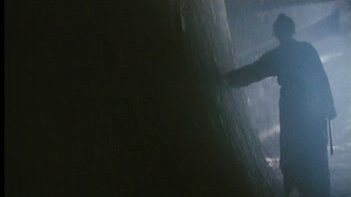|
Text and layout © Ed Shum, 2003. Ed Shum asserts the moral right to be identified as the author of this work |
|
Long Reviews |
|
On the other hand, not everything works perfectly in this film. There arenít any real faults, but those who arenít immediately enamoured by its grand design will tend to notice areas which may occasionally lose the feel of the filmís otherwise uniform excellence. On further viewing, such non-sequiturs become less noticeable, or even part of the filmís own peculiar charm, but initially they may appear embarrassing or even cliched. An example is Brigitte Linís overall performance, which though good appears a little overacted at first (and the Cantonese dubbing seems sloppy, which doesnít help) compared to the measured emotions of the rest of the cast. Of course, this can all be explained as her character being a counterpoint to Leslie Cheungís coolness, a character hurting in a way such as to be mentally disturbed. But such explanations still require an extra viewing in order to address the initial cringe reflex. Other scenes may at first strike as slightly contrived, for example Tony Leung Chiu-Waiís death speech about not expecting to hear his own blood spurt out, but such is the nature of things I have already accepted this to be a part of the filmís natural structure. However, those not traditionally enamoured by Wong Kar Waiís work are unlikely to be so forgiving and be won over by this film - aside from the various Ďidiosyncrasiesí and contrivances (which any fan would forgive or even relish on further viewing), the filmís themes, between the excellent stylisms, are inescapably Ďtalkyí and conceptual: which may not be entertaining for some even though for others it provides epiphany-like lift. In more recent movies Wong has managed to alter his thematic presentation with his further experience in technique, but it seems that his movies - still essentially concept movies that can effect an unprecedented emotional connection with some - will not be Ďfeltí as intensely by everyone. |
|
Review of Ashes Of Time (1994) |
|
|
|
...Continued... [Page 3] |
|
End |
|
So overall I would say that this film is an utterly spectacular experience at the sensory and, if you become attuned to it, emotional level. It shares a lot of thematic ground with the movie that Wong Kar Wai became world famous with, Chungking Express, which was practically made in the middle of Ashes Of Time. But whereas Chungking Express has spontaneous youth-like pizzazz, and neon-soaked urbanity to identify with, Ashes Of Time must use skewered imagination to create another world. Ashes Of Time is undoubtedly less Ďhipí, but the emotional presentation is more direct, perhaps purer. The result can be seen as ostentatious compared to Chungking Expressís minimalism, but these differences are more in surface flavour than in substance. Chungking Express uses more coded and playful references to emotions and concepts, more everyday, identifiable and - inescapable in urban society - consumerist in visualisation. Ashes Of Time has to work with less coded emotion as its connection to the audience. Neither Ďmethodí is superior in itself - itís just a matter of taste and Wong Kar Wai has smartly covered all the bases. In my opinion though, Ashes Of Time perhaps is more daring to portray such a complex yet direct emotional vista, thereby managing to be deeper and lift higher in my experience. This is purely subjective and doesnít mean one is better than the other: Chungking Express can create a different feeling and be more uplifting and life-affirming in a different way to Ashes Of Time, and it has its less conspicuous emotional depths too. |
|
In closing then, Ashes Of Time, like most of Wong Kar Waiís films, can redefine your outlook on cinema. Itís one of his best movies but those who donít find it easy to connect with his films are likely to find this his least accessible. However, those who do may appreciate this as one of the most moving, memorable experiences on film. |
|
A drop in the ocean: the filmís spectacular surface is used to augment a philosophical richness which is worn squarely on its sleeve. Yet, vitally, the film never loses its profoundly human outlook |
|
Blind manís bluff: donít worry if you still feel a bit lost after seeing the film; Maggie herself remarked that it took her two viewings to understand what was going on - this is definitely a film where repeated viewings pay off |
|
Page: |
|
Page: |

